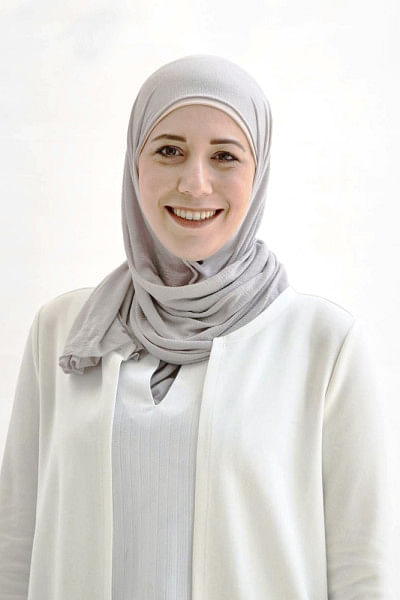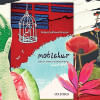Palestinian architect Sara Khasib on using architecture and planning to resist displacement

Buildings can be more than walls and roofs. They carry memory, identity and the history of a place. In Palestine, however, buildings are being bombarded, homes are constantly under threat of being demolished, lands are seized without warning, and everyday movement is restricted with relentless surveillance and control. During her visit to Dhaka, Palestinian architect and educator Sara Khasib shed light on the horrors faced by her people and how architecture and planning can be powerful tools of resilience and resistance.

Destruction of a land
"What is happening in Palestine, particularly in Gaza, cannot be fully captured by the media," observed Khasib, who is currently working as an instructor at the Department of Architectural Engineering & Planning at Birzeit University, West Bank. "The scale of the loss and suffering imposed on Palestinian families and children is often unseen or unspoken."
While the world watches in horror as mass destruction unfolds, countless challenges and forms of oppression lie behind the scenes of mainstream news. Khasib spoke to us about the strategic fragmentation of Palestinian land in order to divide people, resources and systems, leaving people more vulnerable and deprived of day-to-day needs.
She also talked about how regional planning across Palestine is difficult to execute due to the split territories.
"Each building holds memory, meaning, and a claim to existence," reflected the academic. "Thus, any intervention in the land, no matter how small or temporary, is significant. However, urban expansion for the Palestinian cities is heavily constrained as most of the cities are surrounded by military zones or barriers."
To rebuild, to resist
"I believe that design and planning in the Palestinian context must be read as acts of resistance and resilience," remarked Khasib.
A deliberately fragmented land, where communities are broken into isolated clusters, Khasib sees opportunity. Turning these clusters into self-sufficient spaces by refusing to leave, building with local materials, and holding on to native aesthetics in the face of danger, Palestinians are transforming vulnerability into strength.
"As an academic, I feel a sense of responsibility in empowering students to utilise their design to enhance and preserve Palestinian identity and existence," commented Khasib.
Together with her colleague Mohammad Abualrob at Birzeit University, she had been researching how tools of control, like spatial fragmentation, can be reimagined as tools of resistance.
One example was in the Bedouin communities of Khan Al-Ahmar, located in the West Bank. Despite being isolated and targeted by demolition orders, they relied on handmade homes and schools from recycled materials, restored their structures repeatedly, and formed social networks within their community.
"Architecture and planning in Palestine have become tools for survival, resilience, and confronting the erasure of Palestinian identity," Khasib explained. "Designing adaptable spaces while preserving historical identity is not only about buildings or aesthetics but also about staying, rebuilding, and remembering."
Message for Bangladeshi students and architects
Addressing Bangladeshi architecture students and practitioners, Khasib encouraged deeper engagement. "Take part in conversations, critical discussions and research. Use your voices and platforms to speak up," emphasised Khasib. "Collaborating with Palestinian students and academics is always encouraged and welcomed," she added.
At the end of the conversation, Khasib contemplated the love, kindness, and deep solidarity she experienced during her stay in Dhaka. "It was incredibly emotional for me to meet people who were compassionate, intellectual, and eager to learn about life in Palestine beyond the headlines of the news," she recalled with pleasure.
Khasib concluded by drawing a deeper connection between Palestine and Bangladesh, commenting, "What moved me most were the reflections that connected both histories of Palestine and Bangladesh, which opened a space for enriching and inspiring discussions."
Finally, when we asked Sara Khasib about one thought she wanted to leave for the audience in Bangladesh, she offered a powerful reminder: "Please, always remember."
In her own words: "It is important to bear witness to the Palestinian people's struggle and uphold their rights to exist and to return to their homeland."

 For all latest news, follow The Daily Star's Google News channel.
For all latest news, follow The Daily Star's Google News channel. 








Comments